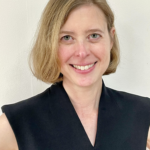Laura Kadetsky
Nonprofit Executive & Attorney, currently Chief Administrative Officer & General Counsel, New Leaders;
Three-time Survivor of Oral Cancer;
Spouse & Mother, Chevy Chase, MD

Laura has survived tongue cancer
three times over the last decade. The first cancer diagnosis came just after
her 33rd birthday. A small spot on her tongue had been irritated for several
months. Doctor after doctor looked at it and assumed it was nothing serious.
Laura finally convinced a doctor to biopsy it just in case, and they were both
shocked when the results came back positive for cancer. That tumor required two
surgeries over the following two months. Fortunately, she was able to go home
the same day after each surgery and get back to eating and speaking clearly
soon thereafter.
Four years later, another area of
irritation in her mouth turned out to be severe dysplasia. Again, the doctors
assumed it unlikely to be serious, until the biopsy proved them wrong. Because
Laura was recently pregnant at the time of the biopsy, she had to wait several
months before surgery, until it would be safer for the developing fetus.
Two years after that, yet another
spot became cancerous. By this point, this surgery felt almost routine.
Horribly enough, Laura and her husband thought they “knew the drill”: “The
surgeon removes a small area of the tongue around the tumor, I go home the same
day and drink liquids for a few weeks until I can eat on the other side of my
mouth again. This was something to get through, but we could handle it. My son
was still young enough not to really notice what was going on.”
No one knew why she got tongue cancer. Laura had never smoked a cigarette and wasn’t a heavy drinker. The tumor was not HPV positive. She was young and female. There were assumptions that other health conditions or medicines she had taken might have contributed to it, but in the end, nothing was certain. Because of her apparently low-risk profile, Laura moved forward by considering each of these events to be one-time flukes that were now behind her.
It was the next time, in 2020, when the landscape of her cancer shifted, along with that of our country. The coronavirus pandemic exploded in the U.S. in early March. Schools and workplaces across the country suddenly closed, and hospitals shut their doors to all but the most critical medical cases. In the midst of this, another spot appeared on her tongue. The pandemic changed everything that had become routine about her prior cancers. The biopsy was scheduled, canceled, and then rescheduled as directives for non-essential medical procedures and ENT procedures changed. The usual post-surgery foods she stocked were harder to get due to supply shortages and competition for grocery delivery. Every trip to the doctor’s office presented a minefield of invisible germs to avoid. Getting a second opinion in-person was impossible when travel was restricted, and doctors’ offices were closed.
Her surgery took place in an
eerily empty hospital, as only the most serious cases were allowed to proceed.
The usually busy pre-surgery room had only two patients in it. When the
anesthesia kicked in, Laura didn’t know how intensive the surgery would be. She
had to trust the doctor, who she had known and trusted for 6 years. Laura had
two second opinions, via video, and felt that she had no other reasonable
choice. She was right to trust him, as, when she woke up, he had managed to do
the simpler surgery – no free flap, no lymph node removal, no trach, no
ventilator, no ICU. Unlike the other times, though, Laura had to stay in the
hospital for several nights. She couldn’t figure out how to make her tongue
swallow, so she couldn’t go home. In the hospital, with COVID-19 patients on
her floor, she was confined to her room until she could hydrate herself and go
home.
The surgical pathology report
indicated that a neck dissection was warranted, so Laura prepared for yet
another surgery just a few weeks later. But to be sure, she had the pathology
redone by both the original hospital and a second hospital. The second set of
results indicated that a neck dissection was not within the guidelines.
Instead, she would continue to be monitored with regular scans and exams.
Over this past decade of ups and
downs, Laura experienced the critical importance of patients, and their
caregivers, advocating for their care. She cannot personally evaluate medical
results, so she continually relied on second opinions – and a close friend in
the field – to evaluate the information she received. Doing so helped her get
the cancer diagnosed in the first place, before it spread too far, and avoid
unnecessary surgeries.
“Before the pandemic, my cancer
was invisible to people, and, beyond a small circle of friends and immediate
family members, I kept it that way. I’ve recovered my speech and most of my
ability to eat after each surgery. I’ve avoided chemo or radiation, and I have
no visible scars. I built a privacy wall around my cancer,” explained Laura.
“The pandemic, however, made me knock it down. It stripped away the strategies
I’d built up to get through each cancer experience and required that I rebuild
a new way of living as a survivor. That includes my responsibility to use the
voice I have – both physically after tongue cancer and as an advocate – to
raise awareness of oral cancer and of the collateral damage to patients and
their care from a lack of individual responsibility around COVID.”
Laura wrote in The Washington Post
about the pandemic’s isolation of patients and how that compounds the hardship
of illness, for both the patient and the caregiver. She plans to continue to
use her voice to speak for head and neck cancer awareness.
To request Laura for your local event, please contact us at info@headandneck.org or complete the online form.
